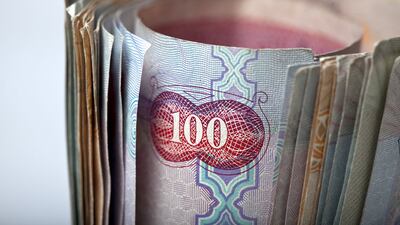Live updates: follow the latest news on Russia-Ukraine
Banks in the UAE and Saudi Arabia remain relatively insulated from the fallout of the Russia-Ukraine conflict due to their limited dealings with the region, according to S&P Global Ratings.
“The conflict will have a limited effect on the UAE’s banking sector, for now. Rated UAE banks have minimal direct exposure to Russian or Ukrainian counterparties. We do not expect to see any significant direct effects of the conflict on their asset quality indicators,” the rating agency said in a report this week.
“The government has significant capacity and willingness to provide support if needed,” it said.
Lenders in Saudi Arabia, the Arab world's largest economy, share a similar outlook.
“Rated Saudi banks have little direct exposure to Russian or Ukrainian counterparties. We do not expect to see any significant direct effects of the conflict on their asset quality indicators,” the report said. “The banking system growth is fuelled by mortgages and corporate lending linked to Vision 2030.”
Banks in the GCC stand to gain from higher energy prices and a rise in interest rates that will significantly improve their bottom lines as cost of risk continues to decline amid economic growth in the region, the rating agency said last month.
Brent prices, which rallied to a notch under $140 per barrel mark earlier this year, have since dropped, but are still trading above the $100 mark. If the war in Ukraine continues, average oil prices could hit $135 per barrel this year, Japanese lender MUFG Bank said.
Higher oil prices will improve the economic and fiscal outlook in both Saudi Arabia and the UAE, S&P said in its latest report. This, in turn, will support the outlook for banks in the Arab world's two largest economies.
“We expect the Saudi economy to continue its rebound over 2022, supported by higher oil prices and recovering production volumes. The non-oil economy will likely benefit from Vision 2030 projects and related spending,” it said.
An increase in benchmark interest rates will also boost earnings for banks.
On March 16, the central banks of the UAE, Saudi Arabia, Bahrain and Kuwait increased their benchmark interest rates after the US Federal Reserve raised its key rates to rein in inflation, which hit a 40-year high in the world's largest economy.
In the UAE, lenders' net income will increase 15 per cent, and return on assets will rise 1.4 per cent, for every 100 basis points (bps) increase in interest rates, S&P said.
Despite the interest rate increase, lending growth is likely to accelerate, underpinned by the UAE’s economic growth, with real gross domestic product expected to grow 3.8 per cent this year, the report said.
Meanwhile, banks in Saudi will see an average 11.5 per cent increase in net income and 1.1 per cent rise in return on assets for every 100 bps rise in interest rates, the agency said.
“The banking sector [in the kingdom] is in an overall net external asset position, with limited reliance on external funding due to a large domestic deposit base, and historically small overseas operations,” the report said.
“We expect 2022 to provide stability, supported by increasing lending books and an improving economic environment.”
Some lenders across the Middle East and Africa region will be affected by some of the major indirect effects of the conflict, the rating agency said. These include higher oil prices, higher food prices, leading to inflationary pressure and current account deficits; and increased investor risk aversion, which could increase vulnerability for banking systems with substantial net external debt, the report said.


